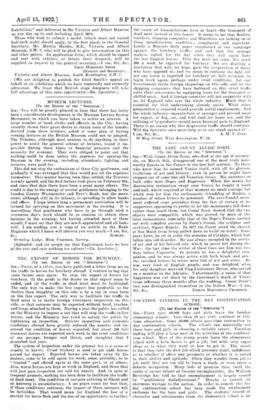THE LATE COUNT ALVISE ZORZI.
(To THE EDITOR OF THE " SPECTATOR.") SUI,—With Count Alvise Zorzi, who died at the age of seventy- six, on March 11th, disappeared one of the most truly note- worthy figures in the Venice of the last half century. To those who knew him he seemed Venice itself, with all its glorious traditions of art and history: even in person he might have stepped out of some fine old Venetian fresco. His ancestors on both sides were Doges and Dogaresse. When the mania for destructive restoration swept over Venice he fought it tooth and nail, which required at that moment no small courage, but which won for him the enthusiastic friendship of Ruskin, a number of whose letters he possessed. The anti-Vandal move- ment suffered some prejudice from the fact of certain of its supporters appearing to prefer to let the monuments fall down rather than touch them, but Count Zorzi showed that the two objects were compatible, which was proved by most of the later restorations, especially that of the Doge's Palace, carried out with complete success by Zorzi's friend, the sculptor and architect, Signor Rupolo. In 1877 the Count saved the church of San Moise from being pulled down to build an hotel! Some years later, he set in order the museum of Cividale, which had fallen into sad disorder. He was always occupied in the servi(' of art and of his beloved city, which he never left during the War : the last time the writer of these lines saw him was two days before Caporctto. In private he was a delightful com- panion, and he was always active with both brush and pen : the versified letters he wrote were full of wit and verve. Ile was very fond of English people, and was delighted when his only daughter married Flag-Lieutenant Byron, who served on a monitor in the Adriatic. Unfortunately, a union of ideal happiness was cut short by the lieutenant's death at Venice from influenza three months after the wedding. Count Zorzi's two sons distinguished themselves in the Italian War.—T am,


































 Previous page
Previous page